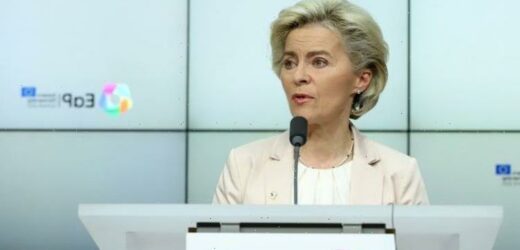Gas crisis: Expert issues warning over 'significant' price rises
We use your sign-up to provide content in ways you’ve consented to and to improve our understanding of you. This may include adverts from us and 3rd parties based on our understanding. You can unsubscribe at any time. More info
It comes as Brussels unveiled measures to both avert the gas crisis currently taking hold in Europe as well as decreasing reliance on gas as it transitions to cleaner fuel sources. The package of measures, published yesterday and being discussed today at the EU summit, includes integrating low-carbon gases such as hydrogen into the network by creating a new market and governance structure for hydrogen.
It would require oil and gas operators to find and fix methane leaks, and a ban on venting and flaring of greenhouse gases.
EU energy commissioner Kadri Simson said: “Today’s proposals are designed to make sure that the role of natural gas in our energy system declines and that greener options like renewables, hydrogen, biomass and biogas increase.”
But the measures have come under fire, as critics argue the gas industry would still play an important part in the future of the EU’s energy grid.
Patrick ten Brink, director of EU policy at the European Environmental Bureau, said: “This package was crucial to accelerate the transition towards a decarbonised energy system.
“Yet the Commission has ceded ground to industry polluters, giving them a chance to greenwash their fossil business and emissions.”
Among other measures, part of the package was to allow joint gas purchases, and the bloc has argued that gas is still needed for countries to transition away from coal.


The new system would allow member states’ transmission system operators (TSO) to jointly buy strategic stocks of gas, which could be used in an emergency situation when supplies become extremely scarce.
Countries including Spain, Greece and Romania have argued this would help shore up supplies.
This comes after Russia deliberately restricted volumes of gas travelling into Europe in the hope to speed up the certification of the new certification of the Nord Stream 2 pipeline, which will transit gas from Russia into Europe.
The move brought Europe’s reliance on Russian gas to the forefront of the EU debate as energy security became threatened while prices skyrocket.
And while some argue that the new package of measures will help avert a crisis, as well as reduce reliance on fossil fuels, others are not so sure.
The Commission’s impact assessment for cutting emissions this decade found that gas consumption should reduce 32-37 percent between 2015 and 2030.
While the new proposal will mean gas network operators must include information about infrastructure that can be decommissioned or repurposed, the plan does not lay out targets or milestones to end gas exploitation and downsize the infrastructure, its critics argue.

Raphael Hanoteaux, senior policy advisor on gas politics at E3G, said: “The legislation is not opening the door for reducing gas consumption.”
And Eilidh Robb, a campaigner from environmentalist group Friends of the Earth Europe, said: “A gas package that fails to deliver a phase-out of fossil fuels is simply further hypocrisy in the face of a climate emergency that much of Europe is historically responsible for.
“The control that the gas industry has on decision-making for infrastructure across Europe has not changed.
“If you continue to let the industry set the agenda, then you are going to continue to have gas.”
The European Network of Transmission System Operators for Gas, an industry body for national and regional grid operators, will propose lists of gas pipelines and terminals that should be built over a 10-year period.
And the structures of a new governance system for the hydrogen market have been modelled on the gas system.
The European Network of Network Operators for Hydrogen will promote a dedicated hydrogen infrastructure and the construction of cross-border networks.
DON’T MISS
EU supply chain crisis as HGV drivers protest green taxes [REPORT]
Mystery illness sweeps through South Sudan as 89 dead [REVEAL]
Einstein’s theory rewritten to solve universe’s greatest mystery [INSIGHT]


But so far, there are no plans to introduce independent checks or introduce a wider range of stakeholders in the process.
This, critics say, means it will be entirely operated by the gas sector.
Mr Hanoteaux said: “It’s hard to see how this hydrogen network is not going to be completely decided by gas operators because there are dominating the sector at the moment.
“The EU is lacking overall cohesion on gas. The package is suggesting gas is on its way out but will be replaced by low-carbon gases which is problematic because it means the EU will still use gas and gas infrastructure for a long time.”
Campaigners are worried that this will enable more gas to be produced, as low-carbon hydrogen still requires the use of gas, with the proposal allowing for blending up to 5 percent of hydrogen into the gas supply.
Source: Read Full Article


